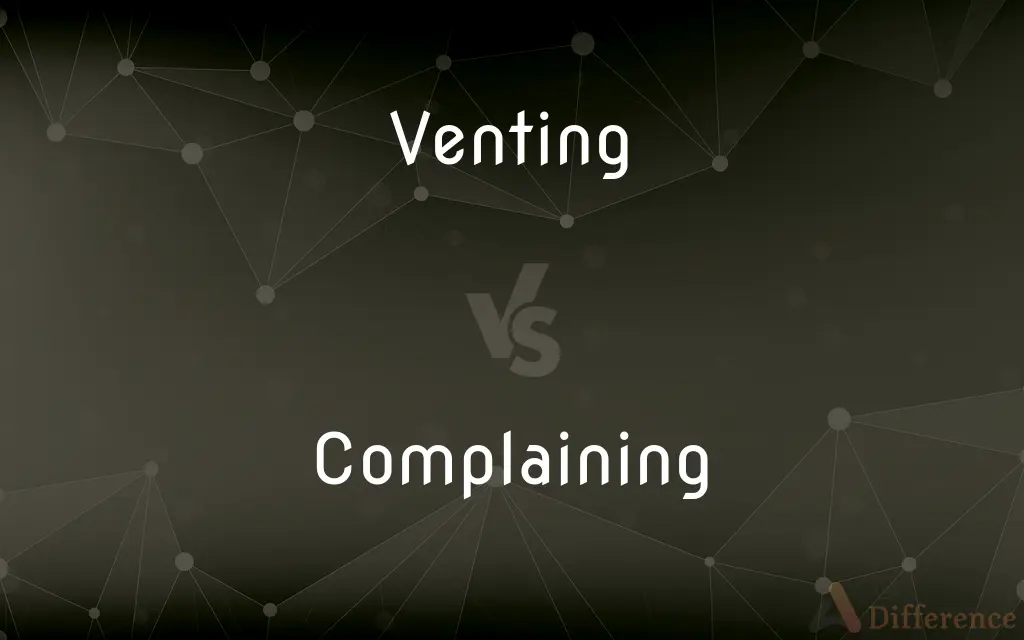Venting vs. Complaining — What's the Difference?
By Urooj Arif & Maham Liaqat — Published on March 3, 2024
Venting is expressing emotions to relieve stress, often without seeking solutions, while complaining is voicing dissatisfaction with the aim of resolving an issue.

Difference Between Venting and Complaining
Table of Contents
ADVERTISEMENT
Key Differences
Venting serves as an emotional release, where an individual shares feelings or frustrations without necessarily looking for advice or solutions. It's a way to let out pent-up emotions to feel better. Complaining, however, is more targeted and often involves stating a problem with the expectation of finding a resolution or eliciting change. While both involve expressing discontent, the intent behind them significantly differs.
When someone vents, they may simply need a listening ear to process their emotions. This act can be therapeutic and is usually directed at a neutral party. On the other hand, complaining is often directed at the source of dissatisfaction or someone who can address the problem, with the complainer hoping for an action or response to their issue.
Venting is characterized by a broad expression of emotions, which might include various aspects of one's life or a specific event that has caused stress or anger. It's not necessarily rational or solution-oriented but serves to reduce emotional tension. Complaining, in contrast, is more focused and specific, aiming at an issue with the desire for a solution or change.
One can vent in a way that's not accusatory or critical of others, focusing instead on their own feelings and experiences. It's a subjective expression of emotions. Complaining, however, often involves criticism or pointing out faults in others, services, or products, with the intent of highlighting a deficiency that needs correction.
Understanding the difference between venting and complaining can help in choosing the appropriate approach for emotional health and effective communication. While venting is about seeking emotional support, complaining is about seeking solutions, and recognizing the need for each can lead to better personal and interpersonal outcomes.
ADVERTISEMENT
Comparison Chart
Purpose
To express emotions for personal relief
To voice dissatisfaction with the aim of resolving an issue
Expectation
Emotional support, not necessarily seeking solutions
Solutions or changes to a situation
Direction
Generally towards a sympathetic listener
Towards someone who can address or is responsible for the issue
Nature
Emotional, may involve a range of feelings
More focused, with specific grievances
Outcome
Emotional relief and reduced stress
Potential resolution or acknowledgment of the complaint
Compare with Definitions
Venting
Emotional expression for relief.
After a tough day at work, venting to a friend can be a great stress reliever.
Complaining
Often directed at the problem's source.
They complained to the city council about the lack of streetlights.
Venting
Not seeking solutions.
I just need to vent for a moment; I'm not looking for any advice.
Complaining
Voicing dissatisfaction for change.
He filed a complaint about the noisy construction.
Venting
Directed at sympathetic listeners.
She vented to her diary, finding solace in the pages.
Complaining
Seeking solutions or actions.
Complaining to the manager brought the issue to their immediate attention.
Venting
Focused on personal feelings.
Venting allowed him to express his frustration without blaming anyone.
Complaining
Specific grievances are highlighted.
Her complaint detailed the product's malfunction.
Venting
Aims for emotional support.
Venting to her dog, she felt a sense of calm and support.
Complaining
Aims for resolution or acknowledgment.
By complaining, they hoped for a refund or exchange.
Venting
Forceful expression or release of pent-up thoughts or feelings
Give vent to one's anger.
Complaining
To express feelings of pain, dissatisfaction, or resentment.
Venting
To express (one's thoughts or feelings, for example), especially forcefully.
Complaining
To make a formal accusation or bring a formal charge; file a complaint.
Venting
The act by which something is vented.
Complaining
The act by which someone complains; a complaint.
Venting
The act of venting
Complaining
Uttering complaints. Opposite of uncomplaining.
Complaining
Expressing pain or dissatisfaction of resentment;
A complaining wife
Common Curiosities
What is complaining?
Complaining is voicing dissatisfaction with the aim of eliciting a change or resolution to a problem.
Is venting healthy?
Yes, venting can be a healthy way to manage stress and emotions when done in moderation and to a supportive listener.
Can complaining be positive?
Yes, when done constructively, complaining can lead to positive changes by addressing and resolving issues.
How can I vent effectively?
Choose a supportive listener, express your feelings clearly, and make it known you're looking for emotional support, not solutions.
What is venting?
Venting is expressing emotions to relieve stress, often without the intention of seeking solutions.
Should I avoid venting?
Not necessarily. Venting is a natural emotional process but should be balanced and not impose excessively on others.
How can I tell if I'm venting or complaining?
If you're seeking emotional relief without needing a solution, you're venting. If you're aiming for a problem to be fixed, you're complaining.
Can venting lead to solutions?
Indirectly, yes. It can clarify feelings and sometimes lead to insights or advice from others that suggest solutions.
What's the best way to complain?
Complain with a clear purpose, focusing on the issue and suggesting possible solutions, if applicable.
Can venting turn into complaining?
Yes, if venting focuses on a specific problem and seeks a resolution, it can transition into complaining.
Why do people complain?
People complain to express dissatisfaction and seek solutions or improvements to a situation.
Is it bad to complain?
Not if it's done constructively and with the aim of resolving an issue rather than just spreading negativity.
How does venting affect relationships?
It can strengthen relationships if done respectfully and with mutual understanding, but excessive venting can strain them.
What are the benefits of complaining?
Complaining can lead to problem-solving, improvements, and sometimes necessary social changes.
Is there a right place or time to vent or complain?
Yes, choosing an appropriate time and place, especially where you can speak freely without causing harm or discomfort to others, is important.
Share Your Discovery

Previous Comparison
French Dressing vs. Catalina Dressing
Next Comparison
Ethyl Nitrite vs. NitroethaneAuthor Spotlight
Written by
Urooj ArifUrooj is a skilled content writer at Ask Difference, known for her exceptional ability to simplify complex topics into engaging and informative content. With a passion for research and a flair for clear, concise writing, she consistently delivers articles that resonate with our diverse audience.
Co-written by
Maham Liaqat















































